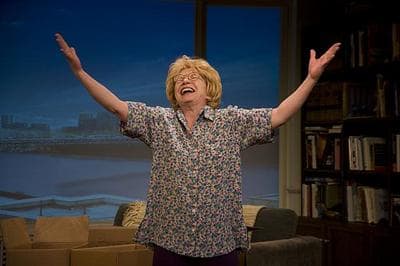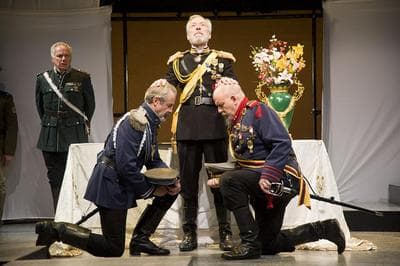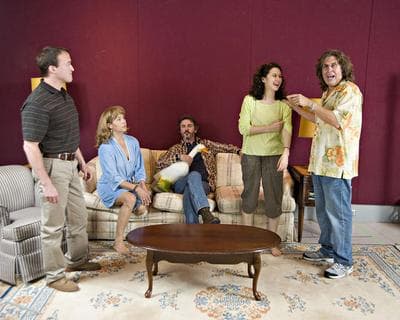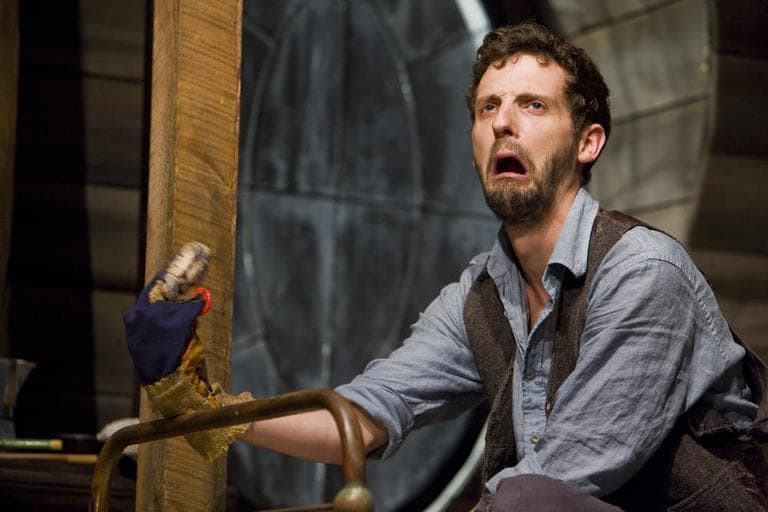Advertisement
Theater Around Town: Summer In The Berkshires
ResumeChristoph von Dohnanyi shares a lot of attributes with former BSO conductor James Levine. Both took orchestras whose reputation was on the wane and restored their world-class standing — von Dohnanyi in Cleveland. Both are masters of the traditional repertory, but also leading proponents of the Second Viennese School — Schoenberg, Berg and Webern (though von Dohnanyi’s taste in contemporary music is much broader than Levine’s.)
It makes sense, then, that von Dohnanyi opens the season at Tanglewood for the BSO Friday night with Beethoven’s Symphony Nos. 5 and 6 while the organization searches for a new leader. And it should be a great start — his complete set of symphonies leading the Clevelanders is superb.
There are, of course, other things to do in the Berkshires, particularly theater and art. Here’s what I got to last week:
'Dr. Ruth: All the Way'

The Barrington Stage Company is now the proud owner of a second theater in Pittsfield, a couple of blocks north of the main stage. The St. Germain stage is named after the company’s resident playwright, Mark St. Germain, who has provided the company with a real crowd-pleaser, “Dr. Ruth: All the Way,” through July 21.
Debra Jo Rupp channels Ruth Westheimer through the Holocaus (she was rescued by kindertransport), Israel, where she was a sniper, three marriages, single parenthood, and, of course, sex therapy.
Rupp overdoes the Baba Wawa enunciations, but is otherwise enjoyable to watch. “Dr. Ruth” isn’t a great play — its best part is the sex therapy, but the journey to get there seems long and underdeveloped. Still, it’s an often fascinating show and Julianne Boyd and her team of talented designers do a great job of making it come alive.
'King Lear'

Dennis Krausnick gets the opportunity of his long career at Shakespeare & Company’s main stage, re-dubbed the Tina Packer Playhouse, as the mad king, through Aug. 19. Packer, the founder and artistic director emeritus, has taken the summer off from Lenox, though her footprints are still detectable here. Packer directed a memorable, if flawed, production some 10 years ago, and also happens to be married to Krausnick.
Rebecca Holderness’s production, set in Tsarist Russia, is much more understated than Packer’s highly charged one and that’s a good thing for the first half. Krausnick’s relatively unemotive delivery helps spread the balance among the talented troupe. Jonathan Epstein is outstanding as Kent, transforming himself from court adviser to revolutionary peasant after he’s banished. (Epstein was Lear in Packer’s production.)
But the momentum doesn’t last into the second act. Krausnick’s Lear ultimately doesn’t scale the heights or depths in his madness; Kelly Galvin’s Cordelia and Peter Macklin’s Edmund are not up to company standards; and the Tsarists vs. the revolutionaries theme runs out of gas. You know you’re losing patience with a Shakespeare tragedy when you start thinking, “Hurry up and die.”
'Parasite Drag'

You often get the sense with a play written by network TV writers that they’re throwing everything into the mix that they can’t get past the censors, and you certainly feel a bit of that in Mark Roberts’s “Parasite Drag” at Shakespeare & Company’s Bernstein Theatre, through Sept. 2. Roberts is the creator of “Mike and Molly” and was a writer for “Two and a Half Men,” neither of which would have allowed the F word, the fairly graphic — if simulated — oral sex, or maybe even the many digs at the evangelical right found here.
Shakespeare & Company has gone in for Family Dysfunction 101 contemporary plays of late, though for most of the first act it seems that Roberts is ready to go beyond that. Elizabeth Aspenlieder as the lovelorn wife of a contemporary Cotton Mather is quite touching, while Jason Asprey as his bad-boy brother accompanied by Kate Abbruzzese as his sexy wife add a ton of charisma. And Patrick Brennan’s set is one of the best I’ve seen in Lenox.
It’s the part of the preacher that’s the problem. For one thing, Roberts apparently never got the memo from Bernard Shaw that you give the best lines to the other side. You’re not telling a liberal audience anything they don’t know, or think they know, by making the evangelical a stick figure like Gene. It is fun to watch the other three pick at him for his hypocrisies and failings for the first act, but the final scene where the two brothers get all demented is almost laughable. Josh Aaron McCabe keeps it together until then, but poor writing and direction (Stephen Rothman) get the better of him, and even of Asprey, as the siblings go to war in the last scene.
'The Puppetmaster of Lodz'

The central character, Finkelbaum, in “The Puppetmaster of Lodz,” at least has good reason to be demented — he used to shovel the corpses of Jewish genocide victims in a concentration camp. He’s now holed up in an apartment house refusing to believe the war is over, despite his landlady’s imprecations that it ended five years earlier. (The play runs at the Berkshire Theatre Festival Unicorn Stage in Stockbridge through July 7 and then Sept. 13 through Oct. 7.)
But playwright Gilles Segal gets remarkably little out of the metaphorical possibilities of the situation, relying instead on Finkelbaum’s repetitious rants of how the landlady is trying to trick him so he’ll go out into the world and be captured by the Nazis. These alternate with his ongoing conversations with his life-size puppet of his wife or lover, whom he intends to make a star once they can resume their puppetry career.
Joby Earle plays the part with an annoying lack of affect, despite his occasional outbursts. I couldn’t help thinking of the apparently apocryphal story of Pia Zadora’s portrayal of Anne Frank, with an audience member crying out “She’s in the attic” when the Nazis entered the house.
Howard Pyle
I grew up reading volumes of Robin Hood and King Arthur illustrated so cinematically and stirringly by Howard Pyle. The exhibit of his work at the Norman Rockwell Museum in Stockbridge — through Oct. 28 — did not, alas, bring back the days when my greatest career aspiration was to be a Knight of the Round Table — Sir Lancelot specifically.
Pyle was a supreme illustrator but not really a significant artist, one whose aesthetic world had much to say about the real world. The exhibit at the Rockwell tries to convince us otherwise — that Pyle’s original paintings drew on Winslow Homer and Aubrey Beardsley. And the best of the paintings do reflect those sources, but reflecting sources and creating an original vision are two different things. As are illustrations in books and paintings on museum walls.
This program aired on July 4, 2012.
